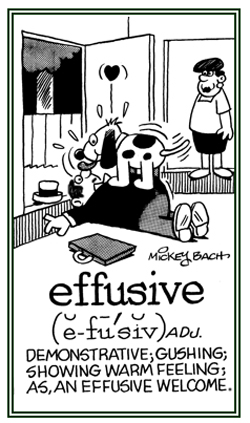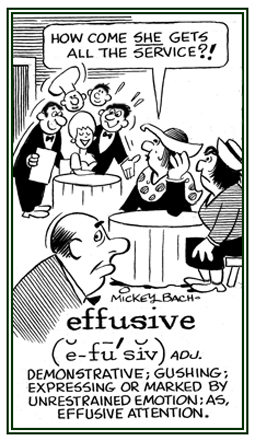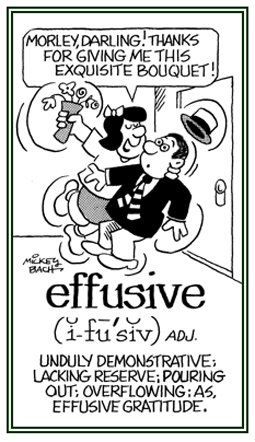ex-, e-, ef-
(Latin: a prefix occurring in words of Latin origin used in the senses: out, out of, from; upward; completely, entirely; to remove from, deprive of; without; former [said of previous holders of office or dignity])
Before f, ex- becomes ef-; before all voiced consonants (as b, d, g, etc.) ex- becomes e-.
effume (verb), effumes; effumed; effuming
To puff or to breathe out smoke.
effuse (verb), effuses; effused; effusing
1. To flow out, or to make something; such as, a liquid, gas, or light flow out.
2. To spread out or to radiate from something.
2. To spread out or to radiate from something.
1. An instance of giving off an odor or smell: There was an intensely malodorous effusion coming from under the porch at the back of Sara's house that was from a skunk because it was defending itself from the threats of her dog which was barking at it.
2. In medicine, an escape of fluid into a body cavity: The surgeon installed a thin tube into the incision of the abdomen of the patient which would control the effusion, allowing it to drain out of the body and not contribute to possible infections.
3. An instance of unrestrained speech or writing: Although initially very controlled, the convocation speaker eventually spoke with great effusion about the future that lay before the graduate students.
2. In medicine, an escape of fluid into a body cavity: The surgeon installed a thin tube into the incision of the abdomen of the patient which would control the effusion, allowing it to drain out of the body and not contribute to possible infections.
3. An instance of unrestrained speech or writing: Although initially very controlled, the convocation speaker eventually spoke with great effusion about the future that lay before the graduate students.
effusive (adjective), more effusive, most effusive
1. Referring to a vocal expression that is being demonstrated with unrestrained enthusiasm and feelings: Mark gave effusive thanks to his neighbors for their help in restoring his home after it caught on fire.
2. Characteristic of giving or involving an extravagant, and sometimes excessive declaration, of feelings in speech or writing: When Jack and his family arrived at his parent's house, they were greeted with an effusive welcome.

© ALL rights are reserved.

© ALL rights are reserved.

© ALL rights are reserved.
Go to this Word A Day Revisited Index
2. Characteristic of giving or involving an extravagant, and sometimes excessive declaration, of feelings in speech or writing: When Jack and his family arrived at his parent's house, they were greeted with an effusive welcome.



Go to this Word A Day Revisited Index
so you can see more of Mickey Bach's cartoons.
egress (verb), egresses; egressed; egressing
emit (verb), emits; emitted; emitting
1. To give off, send forth, or discharge; as of light, heat, or radiation, vapor, etc. (Example: "The ozone layer blocks some harmful rays which the sun emits").
2. To expel (gases or odors).
3. To express audibly; utter sounds (not necessarily words).
2. To expel (gases or odors).
3. To express audibly; utter sounds (not necessarily words).
entirely (adverb) (not comparable)
evict (verb), evicts; evicted; evicting
1. To force a tenant to leave a property, especially the tenant's residence, usually because he or she has failed to comply with the terms of a lease.
2. To force out; to eject, to expel.
3. In law, to recover (property, for example) by a superior claim or legal process.
4. Etymology: "recover property", from Latin evictus and evincere, "to recover property, to overcome and to expel, to conquer"; from ex-, "out" + vincere, "to conquer".
2. To force out; to eject, to expel.
3. In law, to recover (property, for example) by a superior claim or legal process.
4. Etymology: "recover property", from Latin evictus and evincere, "to recover property, to overcome and to expel, to conquer"; from ex-, "out" + vincere, "to conquer".
exalt (verb), exalts; exalted; exalting
1. To glorify, to praise, or to honor: "Bertha's behavior in her political position has exalted the power and prestige of her office."
2. To highly praise someone or something: "The teacher's scholastic evaluations have exalted Clifton's learning skills to such a degree that he can be assured of getting a scholarship for his advanced studies in a university."
2. To highly praise someone or something: "The teacher's scholastic evaluations have exalted Clifton's learning skills to such a degree that he can be assured of getting a scholarship for his advanced studies in a university."
"The retiring medical doctor was exalted by his medical colleagues for his outstanding career."
3. To present something in a way that is very favorable or even too favorable: "Willard exalts his contributions to the settlement of the labor dispute with his company."
exanimate (eg ZAN uh mayt") (verb), exanimates; exanimated; exanimating
1. To deprive of the appearance life; to kill.
2. To render someone breathless or unconscious.
2. To render someone breathless or unconscious.
exanimate (eg ZAN uh mit) (adjective), more exanimate, most exanimate
1. A reference to the lack of any appearance of life; rendered sluggish, lethargic, and inactive: After a long day at work, James collapsed into his armchair and was so exanimate, or dead to the world, that his wife had to call him several times before he responded!
2. Pertaining to the deprivation of spirits; disheartened; discouraged: After failing her driver’s license test, Lynn was so exanimate that she couldn’t eat her dinner that evening.

© ALL rights are reserved.
Go to this Word A Day Revisited Index
2. Pertaining to the deprivation of spirits; disheartened; discouraged: After failing her driver’s license test, Lynn was so exanimate that she couldn’t eat her dinner that evening.

Go to this Word A Day Revisited Index
so you can see more of Mickey Bach's cartoons.
excel (verb), excels; excelled; excelling
To surpass or to be superior to another person or to others.
1. A section or passage taken from a longer work; such as, a book, a movie, a musical composition, or a document; an extract: Last Sunday, the minister read excerpts from the book of Genesis, in the Bible, to his congregation during his religious sermon.

© ALL rights are reserved.
Go to this Word A Day Revisited Index
Mrs. Song played an excerpt from a concerto on her violin to demonstrate that it is an important musical instrument of an orchestra.
2. Etymology: from Latin ex-, "out" + carpere, "to pluck, to pick"; so the Roman word for an extract or a passage from a book or writing was excerptum, "excerpt".
Go to this Word A Day Revisited Index
so you can see more of Mickey Bach's cartoons.
excerpt (verb), excerpts; excerpted; excerpting
1. The action of making selections from a book, manuscript, etc.
2. To take a part from a longer work or to select a section or passage from a longer work; to abridge by choosing representative sections.
2. To take a part from a longer work or to select a section or passage from a longer work; to abridge by choosing representative sections.


